Overview
The article underscores the ten compelling benefits of enterprise mobile app development specifically tailored for SaaS owners. Customized applications not only enhance user engagement but also streamline workflows and significantly improve overall operational efficiency. This assertion is backed by a wealth of statistics and case studies that illustrate:
- Increased retention rates
- Notable productivity improvements
- The critical need for integrating advanced analytics and robust security measures within mobile solutions
Such insights compel SaaS owners to consider the transformative impact of mobile app development on their business strategies.
Introduction
Enterprise mobile app development is revolutionizing the landscape for SaaS owners, presenting a wealth of advantages that can significantly enhance their business strategies. By leveraging tailored solutions, these proprietors can improve user engagement, streamline operations, and optimize resource management, thus laying the groundwork for sustainable growth. Yet, as technology and user expectations continue to evolve, how can SaaS businesses effectively harness mobile applications to maintain a competitive edge? This article explores ten compelling benefits of enterprise mobile app development, offering insights that could redefine operational success for SaaS companies.
SDA: Tailored Custom Software Development for Enterprise Mobile Apps
SDA excels in delivering custom software solutions tailored to the unique demands of enterprise mobile app development. By leveraging cutting-edge technologies and a user-centric design philosophy, SDA guarantees that each application is not only functional but also strategically aligned with business objectives. This bespoke approach empowers SaaS proprietors to distinguish themselves in a competitive marketplace, significantly boosting engagement and satisfaction.
In 2025, emerging trends in enterprise mobile app development highlight the necessity of integrating advanced security measures, such as encryption and multi-factor authentication, alongside seamless interoperability with existing systems—critical components for maintaining client trust and operational efficiency.
Notably, statistics reveal that [user engagement in enterprise mobile app development solutions](https://blog.sda.company/10-benefits-of-enterprise-mobile-app-development-for-saa-s-owners) can soar by up to 71% when customized options are implemented, underscoring the significance of personalization. Successful case studies from SaaS companies illustrate that prioritizing user-centric design in enterprise mobile app development leads to improved customer experiences and retention.
As Shruti Pise aptly states, "Adopting custom software development is not just about moving forward; it’s about keeping pace with the constantly changing demands of the market."
With industry leaders advocating for the importance of , SDA remains committed to empowering businesses to innovate and thrive in the digital landscape.
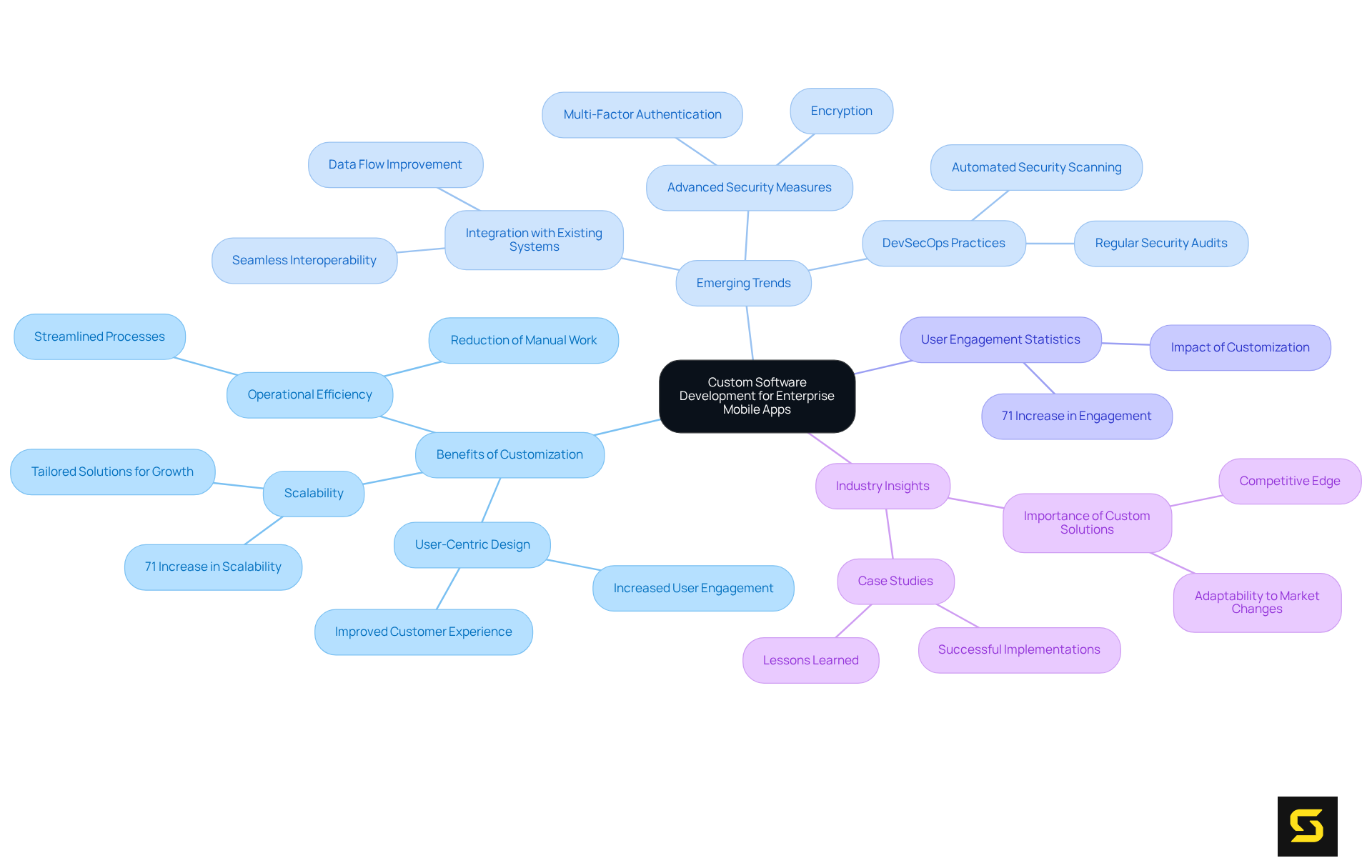
Workflow Optimization: Streamline Processes with Enterprise Mobile Apps
Enterprise applications are pivotal in optimizing workflows, automating routine tasks, and providing real-time access to critical information. This automation significantly and accelerates decision-making processes. For instance, applications can seamlessly integrate with existing systems, facilitating:
- Streamlined approvals
- Tracking project progress
- Efficiently managing resources
Consequently, organizations experience enhanced productivity and improved operational efficiency. As noted by Sergey Ponomarev, "Based on the study, the market is anticipated to expand from $136.84 billion in 2024 to $385.56 billion by 2031," highlighting the growing dependence on portable solutions to achieve business success.
Productivity specialists assert that applications not only improve decision-making speed but also enable teams to react swiftly to evolving business demands, ultimately fostering a more agile and competitive organization. Additionally, enterprise mobile app development simplifies onboarding processes for new employees, ensuring their effective integration into workflows. Moreover, implementing robust data security measures, such as two-factor authentication, is crucial for safeguarding sensitive information within these platforms.
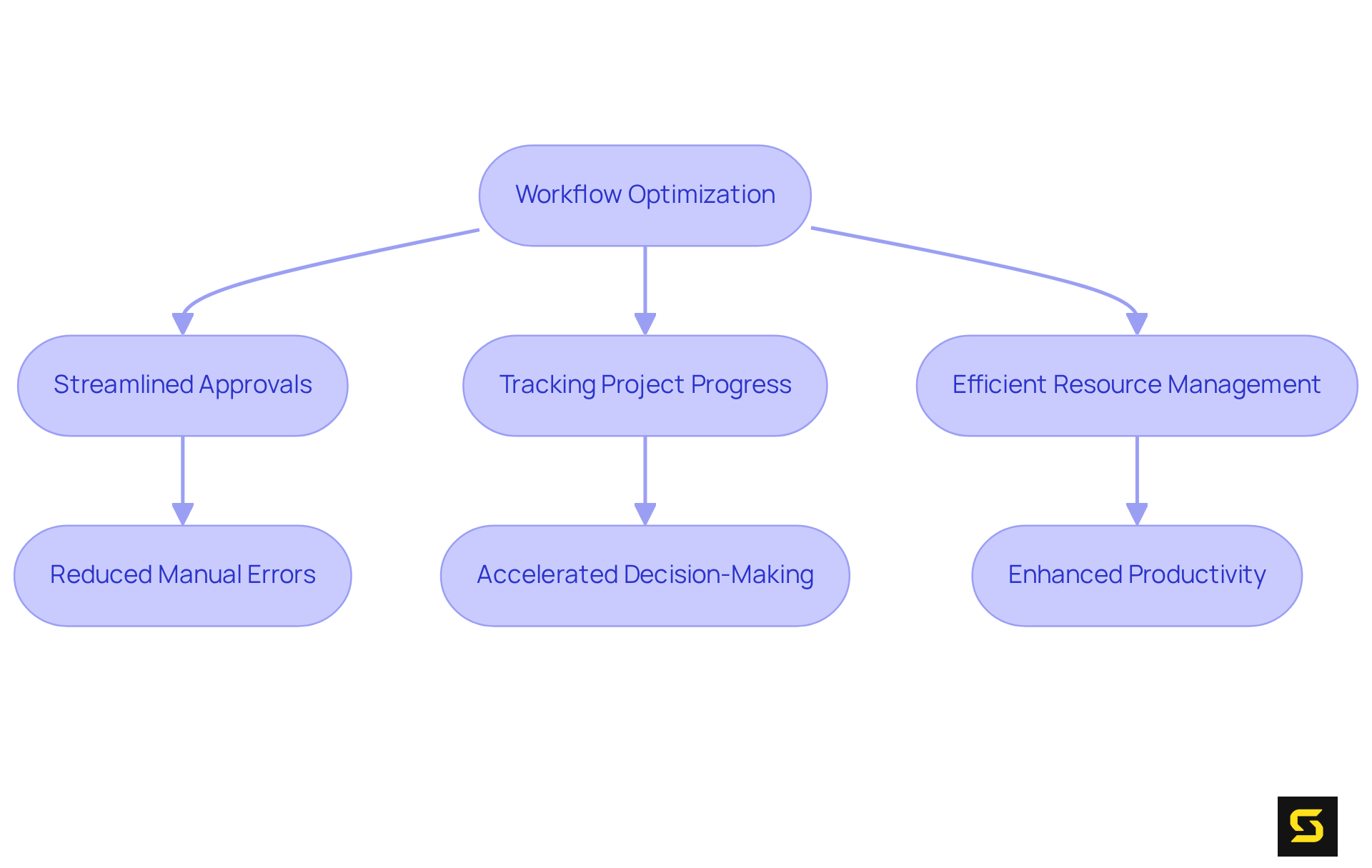
Easier Onboarding: Simplify Employee Integration with Mobile Solutions
Mobile applications can significantly simplify the onboarding process for new employees, providing them with immediate access to training materials, company policies, and essential contacts. This approach not only accelerates the integration of new hires but also ensures they feel supported from day one. Features such as interactive checklists and progress tracking enhance the onboarding experience, making it more engaging and effective.
Organizations that have adopted onboarding solutions for smartphones report an impressive and satisfaction. HR specialists emphasize that applications can revolutionize onboarding by offering immediate feedback and enhancing communication, ultimately resulting in a more connected and knowledgeable workforce.
As Michelle Hague, HR Manager at Solar Panels Network, points out, "The risk of a poor onboarding experience is that it can lead to employee dissatisfaction, which can have long-term effects on morale and productivity." By leveraging technology, companies can guarantee that new employees feel welcomed and prepared to excel in their roles, establishing a foundation for long-term engagement and productivity.
Notably, 69% of employees are more likely to remain with a company for three years if they receive an excellent onboarding experience. Furthermore, involving managers in the onboarding process can make it 3.5 times more effective, further enhancing the integration experience.
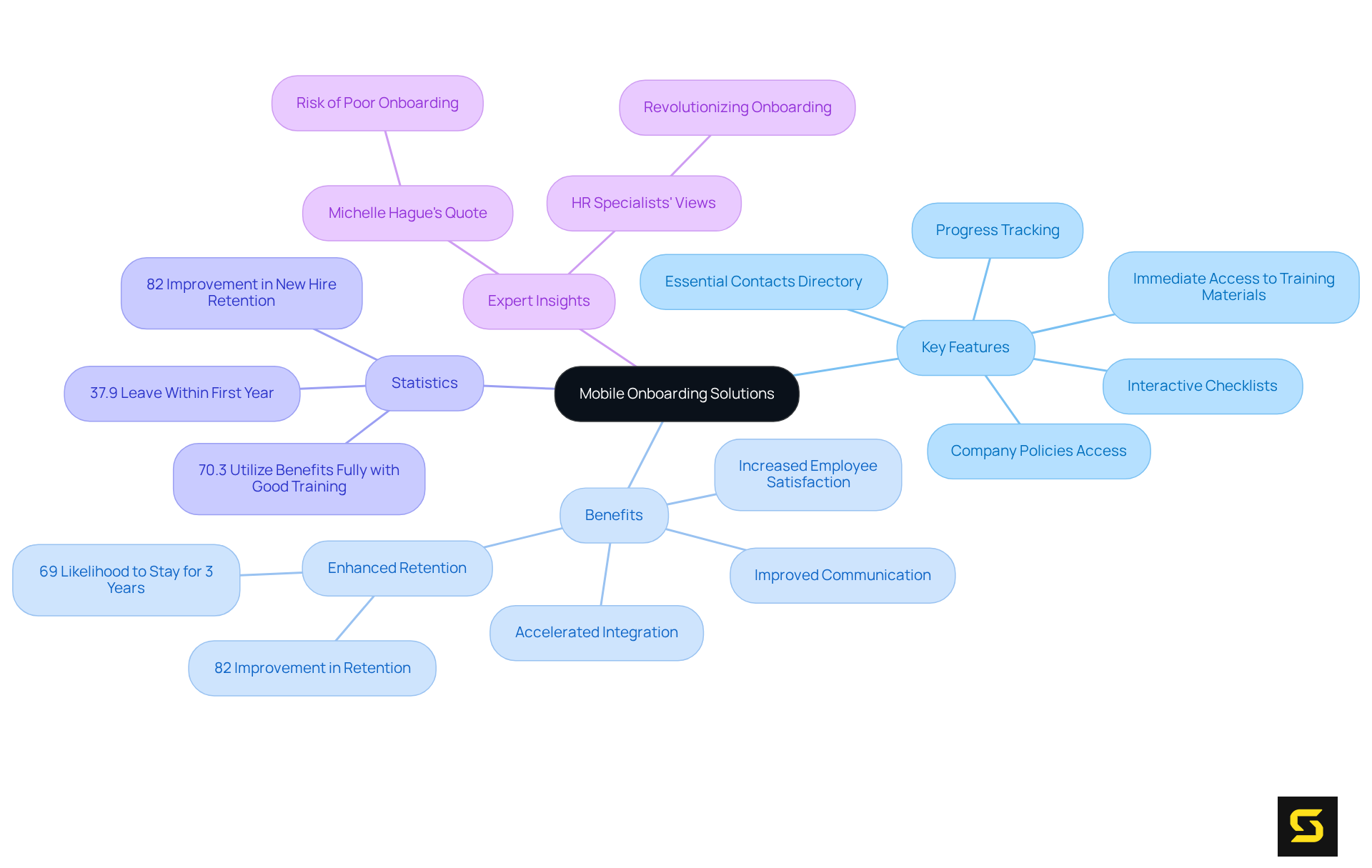
Convenient Monitoring: Enhance Oversight with Mobile Applications
Enterprise applications empower managers with real-time monitoring capabilities, significantly enhancing project oversight. By leveraging features such as dashboards and alerts, organizations can respond immediately to emerging issues, ensuring projects remain on schedule. This proactive approach not only bolsters accountability but also cultivates a culture of transparency within the organization. Management experts emphasize that accountability is essential for effective leadership. As Norman Wood aptly states, "True progress begins when we embrace accountability not as a burden, but as a tool for growth." Utilizing application functionalities allows teams to and enhance communication, ultimately promoting project success while nurturing a collaborative environment.
Furthermore, with approximately 26% of users returning to an app the day after installation, it becomes imperative for SaaS product owners to focus on user engagement strategies that enhance accountability and oversight. Successful implementations, such as the transformation of the Pizza Hut software, illustrate how mobile tools can significantly enhance project management efficiency. The evidence is clear: embracing these technologies not only drives results but also fosters a culture of growth and accountability within organizations.
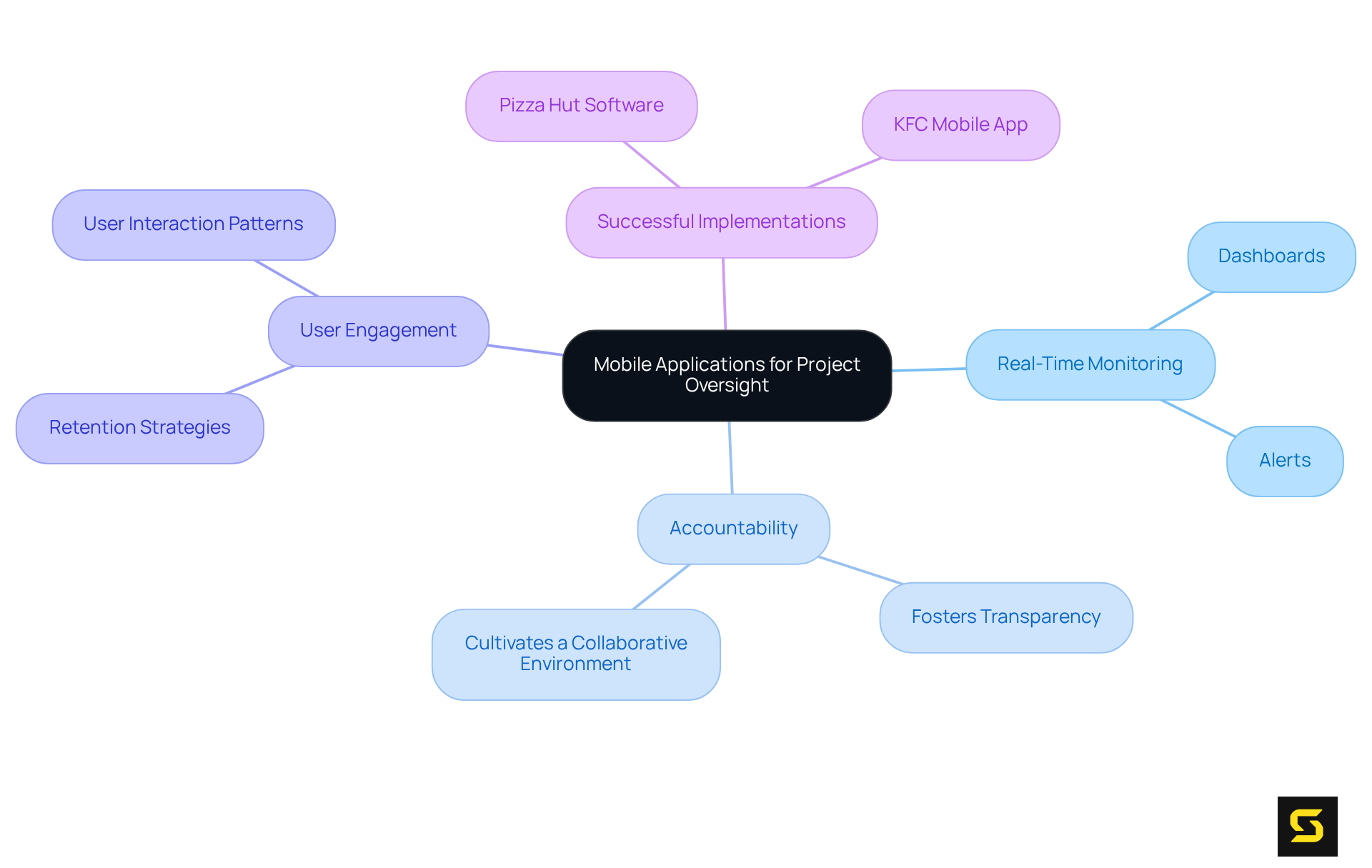
Efficient Management: Optimize Resource Allocation with Mobile Apps
Mobile applications are essential in optimizing resource allocation within organizations, providing powerful tools for tracking usage, availability, and performance. By harnessing analytics, companies can make informed decisions that enhance resource management, ensuring that teams are equipped with the necessary tools and support to excel. This strategic optimization not only reduces waste but also significantly enhances overall project efficiency.
For instance, organizations utilizing analytics tools for smartphones can pinpoint underutilized resources and reallocate them effectively, leading to increased productivity and cost savings. As one data analyst remarked, 'The ability to analyze resource usage in real-time allows teams to pivot quickly and allocate resources where they are most needed, ultimately driving project success.'
Moreover, a case study revealed that Gamejam achieved a by integrating analytics for portable devices into their operations. By adopting portable technology, organizations can streamline processes and enhance their responsiveness to evolving demands, making applications an indispensable asset in today’s fast-paced business landscape.
![]()
Easier Data Processing: Leverage Mobile Apps for Better Insights
Enterprise mobile app development significantly enhances data processing by allowing individuals to collect, analyze, and visualize data anytime, anywhere. This capability empowers teams to make swift, data-driven decisions, greatly improving their responsiveness to market dynamics. By integrating sophisticated analytics tools, such as Google Analytics and Firebase Analytics, directly into the app, organizations can uncover essential insights into user behavior and operational performance.
For instance, in-app engagement analytics can highlight which features resonate most with users, guiding product enhancements and marketing strategies. Furthermore, analytics dashboards provide real-time visualization, allowing teams to monitor key performance indicators (KPIs) such as customer retention rates and growth metrics. This immediate access to accelerates decision-making processes and fosters a culture of continuous improvement.
Analysts emphasize that leveraging mobile analytics is crucial for understanding user preferences and behaviors, ultimately leading to improved business outcomes.
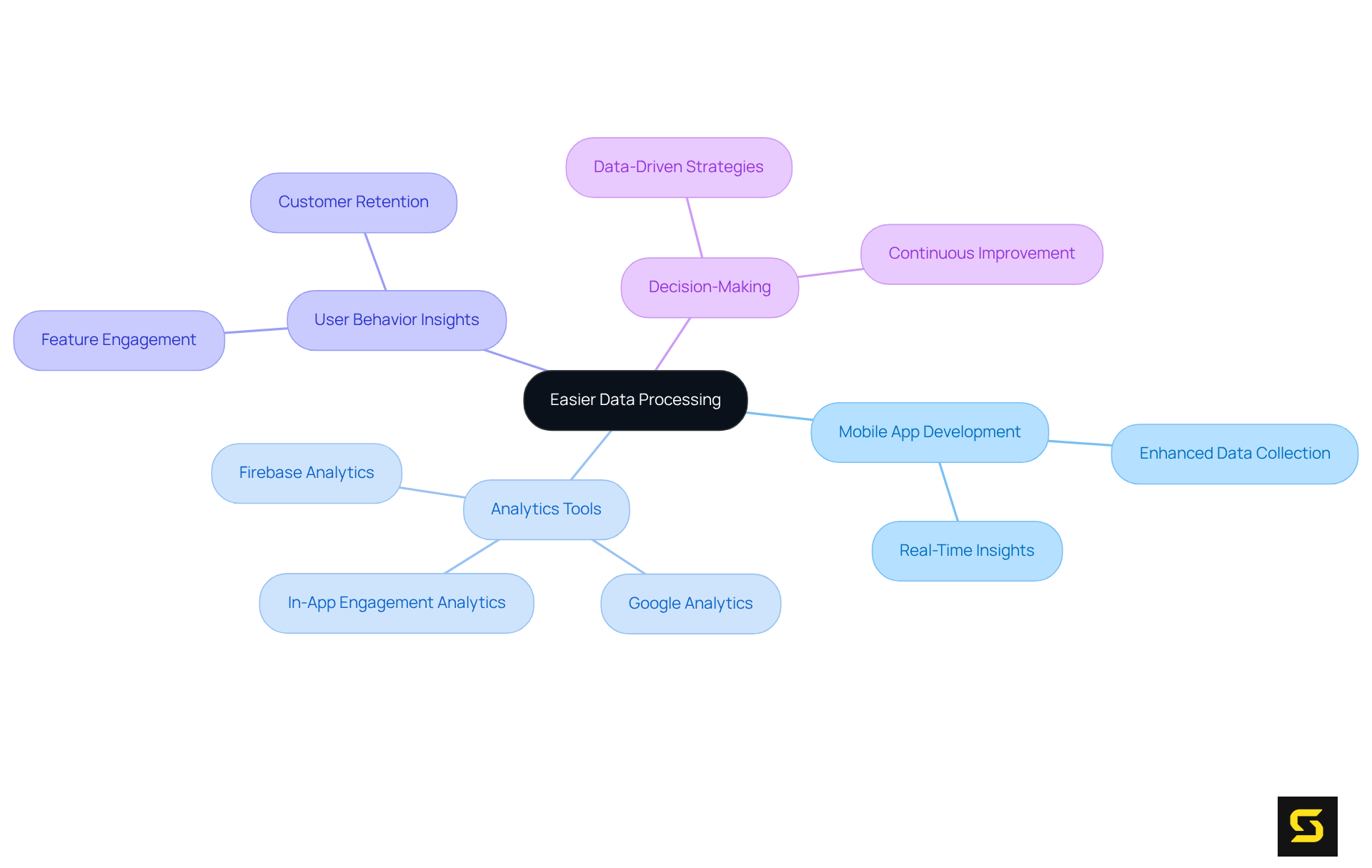
Extensive Databases: Support Large-Scale Data Management with Mobile Apps
Mobile applications are indispensable for managing extensive databases, empowering organizations to efficiently handle large-scale information with agility. By leveraging cloud-based solutions, businesses can guarantee that their data remains accessible, secure, and scalable. This capability is particularly crucial for SaaS proprietors who face the challenge of while ensuring optimal performance and robust security measures.
As G. Suma aptly states, "Data is not merely an asset; it is the foundation of innovation and growth." Furthermore, the global big data market is projected to reach an impressive $103 billion by 2027, underscoring the escalating importance of effective information solutions within the sector. The ability to retrieve and manage information seamlessly through enterprise mobile app development not only enhances operational efficiency but also fortifies data security, enabling organizations to thrive in a competitive landscape.
Additionally, embracing Data-as-a-Service (DaaS) offers SaaS owners flexible and scalable data management solutions, while implementing stringent security measures such as encryption and data anonymization techniques ensures that sensitive information is well-protected.
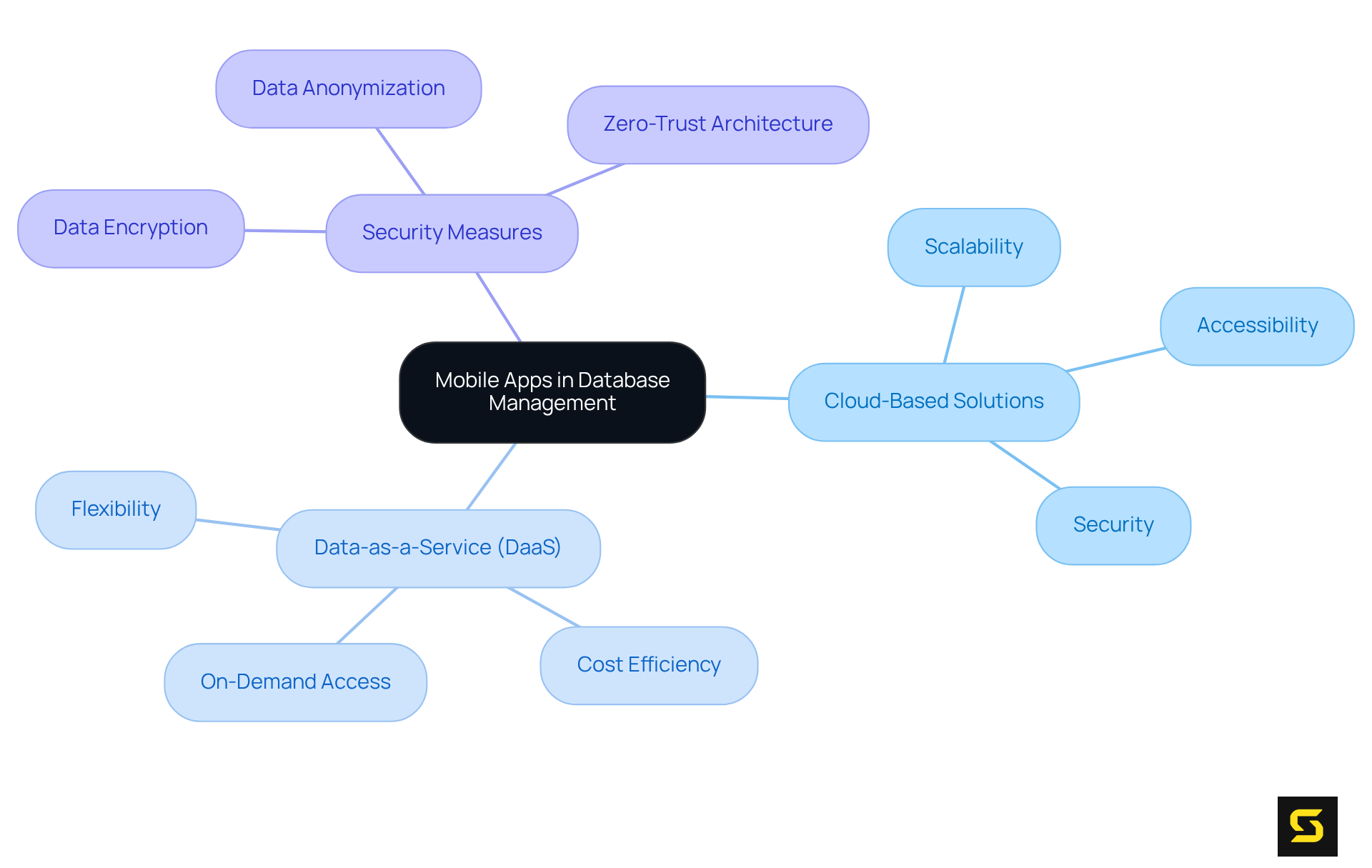
Multiple User Roles: Facilitate Diverse Access with Mobile Solutions
Enterprise mobile app development is aimed at designing applications that empower various roles within organizations, allowing for tailored access and functionalities that align with individual responsibilities. This capability not only bolsters security but also ensures that individuals can access the precise tools and information necessary for their tasks. By implementing role-based access control, businesses can streamline workflows, enhance collaboration across teams, and mitigate risks associated with unauthorized access.
For instance, organizations can assign varying permissions to individuals based on their roles, safeguarding sensitive information and ensuring it is accessible only to those who need it. This strategic approach not only protects critical data but also cultivates a more efficient working environment. Research indicates that 70% of online companies that fail do so due to inadequate usability, underscoring the importance of intuitive design in enhancing user interactions. As cybersecurity specialist [Expert Name] asserts, "Effective role management is vital for improving security and ensuring that individuals interact with the application in a way that aligns with their specific needs."
Moreover, enterprise mobile app development that caters to various roles significantly enhances organizational collaboration. Platforms like [Example Solution] enable team members to access relevant features tailored to their responsibilities, boosting productivity and communication. As [Another Expert Name] emphasizes, "A well-implemented role-based access control system not only protects information but also enables employees to carry out their responsibilities more efficiently, ultimately fostering business success."
This strategic approach to access not only but also empowers employees to perform their roles more effectively, ultimately driving business success.
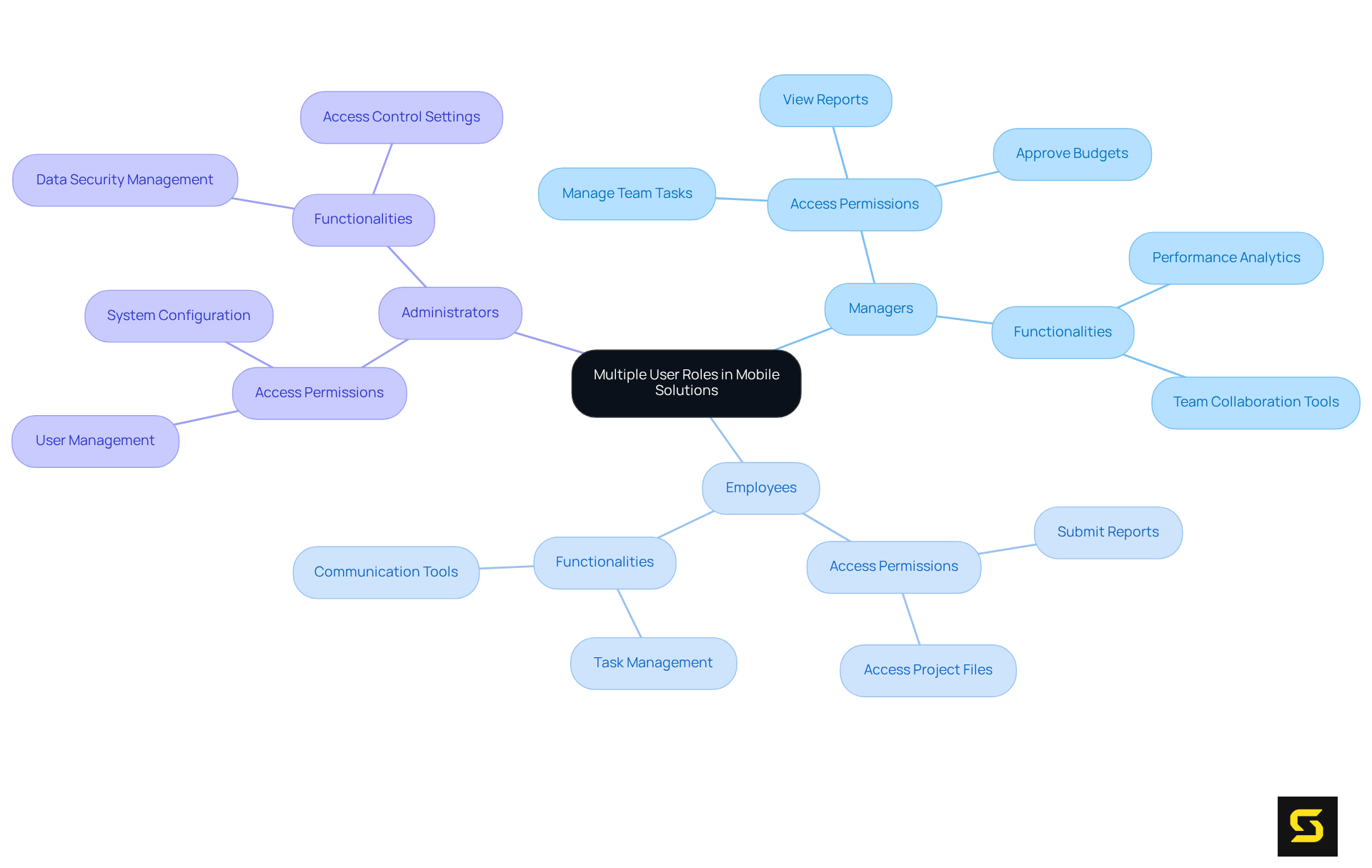
Third-Party App and API Integrations: Expand Functionality of Mobile Apps
Integrating third-party applications and APIs into enterprise mobile app development significantly enhances their functionality, empowering businesses to leverage existing tools and services. This approach not only improves user experience but also reduces the need for extensive development efforts.
For example, the incorporation of:
- Payment gateways
- CRM systems
- Analytics tools
allows users to access a comprehensive suite of features tailored to their diverse needs. Such integrations streamline processes, automate data exchange, and ensure , ultimately driving operational efficiency.
Developers have noted that these integrations facilitate seamless interactions between software, enhancing overall performance and client satisfaction. By adopting an API-first development strategy, organizations can ensure that their enterprise mobile app development is robust, scalable, and aligned with business objectives, paving the way for innovation and growth in the competitive SaaS landscape.
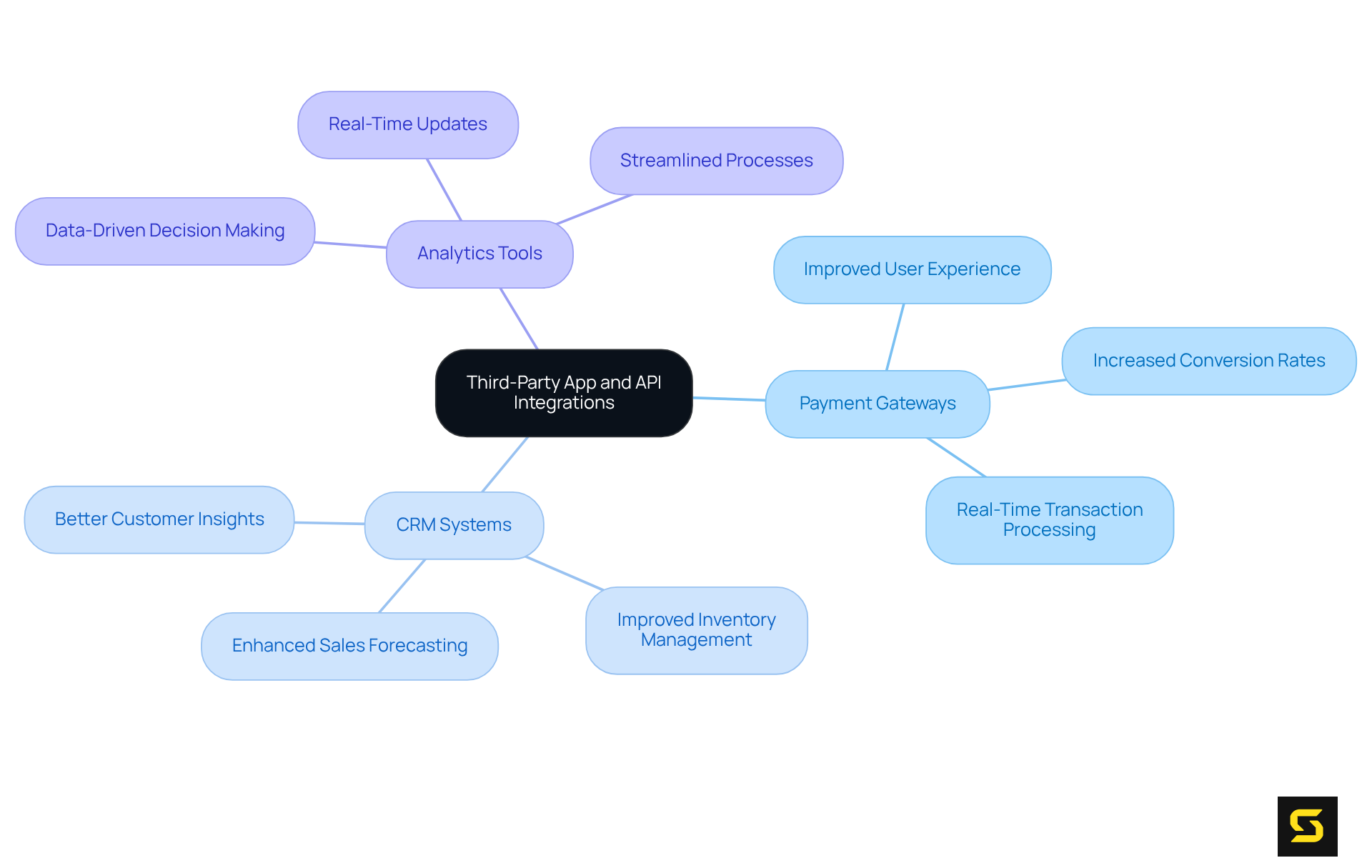
Analytics: Drive Business Decisions with Mobile App Insights
Mobile applications equipped with advanced analytics capabilities provide organizations with essential insights into consumer behavior, app performance, and emerging market trends. This information empowers companies to make informed decisions that not only foster growth but also . For instance, businesses utilizing analytics for smartphones have reported significant improvements in customer retention and satisfaction, achieving a monthly retention rate of 41.5% for clients actively interacting with their applications (source: SRGResearch).
Implementing robust analytics tools enables SaaS owners to effectively monitor key performance indicators (KPIs), facilitating real-time adjustments to their strategies. This adaptability is crucial in a competitive landscape where 70% of Chief Information Officers (CIOs) cite agility and scalability as primary reasons for adopting SaaS solutions (source: SRGResearch). Furthermore, insights gleaned from application data can guide strategic decisions, such as enhancing user experiences and refining marketing initiatives.
Business analysts underscore the significance of mobile app data in shaping growth strategies, highlighting that companies that effectively leverage this information can achieve a 95% profit increase with merely a 5% reduction in churn (source: SRGResearch). By prioritizing user-centric design and data-driven decision-making, SaaS owners can ensure their applications not only meet but exceed user expectations, ultimately paving the way for sustained business success.
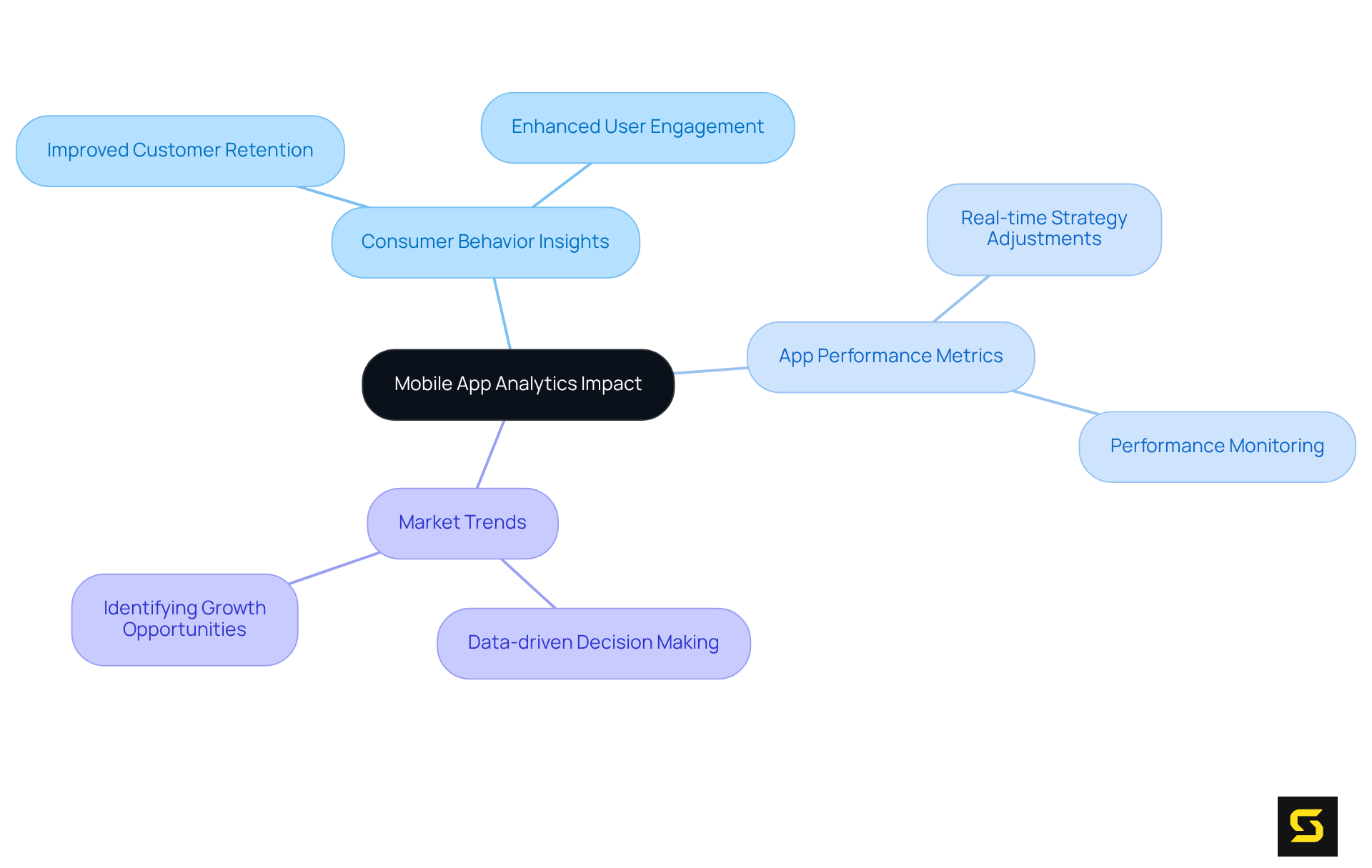
Conclusion
The advantages of enterprise mobile app development for SaaS owners are not just significant; they are transformative, providing a competitive edge in an ever-evolving digital landscape. By focusing on tailored solutions, organizations can enhance engagement, streamline workflows, and ultimately drive growth. The integration of advanced features such as real-time monitoring, resource optimization, and robust data management illustrates how mobile applications can revolutionize operational efficiency and elevate customer satisfaction.
Key insights throughout this discussion reveal that customized mobile applications not only improve user engagement by up to 71% but also facilitate easier onboarding, enhance project oversight, and support extensive data management. These innovations empower organizations to make data-driven decisions, streamline processes, and foster a culture of accountability and transparency. Moreover, the integration of third-party APIs and advanced analytics tools enables businesses to maximize functionality and gain critical insights into user behavior and market trends.
In conclusion, embracing enterprise mobile app development is not merely a trend; it is a strategic necessity for SaaS owners aiming to excel in a competitive environment. By investing in customized mobile solutions, organizations can optimize their operations, enhance user experiences, and ultimately position themselves for sustained success. As the digital landscape continues to evolve, the imperative of leveraging mobile technology to drive business growth cannot be overstated. Now is the time for SaaS businesses to harness the full potential of enterprise mobile applications and secure their place at the forefront of innovation.
Frequently Asked Questions
What is SDA's approach to custom software development for enterprise mobile apps?
SDA focuses on delivering custom software solutions tailored to the unique demands of enterprise mobile app development, using cutting-edge technologies and a user-centric design philosophy to align applications with business objectives.
What are the emerging trends in enterprise mobile app development for 2025?
Emerging trends highlight the need for advanced security measures, such as encryption and multi-factor authentication, as well as seamless interoperability with existing systems to maintain client trust and operational efficiency.
How does customization impact user engagement in enterprise mobile apps?
Customization can increase user engagement in enterprise mobile app solutions by up to 71%, emphasizing the importance of personalized options for improving customer experiences and retention.
What role do enterprise applications play in workflow optimization?
Enterprise applications optimize workflows by automating routine tasks and providing real-time access to critical information, which reduces manual errors and accelerates decision-making processes.
How can mobile applications simplify the onboarding process for new employees?
Mobile applications simplify onboarding by providing immediate access to training materials, company policies, and essential contacts, enhancing the integration experience with features like interactive checklists and progress tracking.
What are the benefits of using mobile solutions for onboarding?
Organizations that use mobile onboarding solutions report an 82% improvement in new hire retention and satisfaction, as well as enhanced communication and immediate feedback for new employees.
How does the involvement of managers affect the onboarding process?
Involving managers in the onboarding process can make it 3.5 times more effective, significantly enhancing the integration experience for new hires.
What is the projected growth of the enterprise mobile app market?
The enterprise mobile app market is anticipated to expand from $136.84 billion in 2024 to $385.56 billion by 2031, indicating a growing dependence on mobile solutions for business success.





